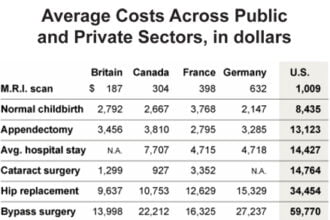Pharmaceutical Benefits Manager (PBM) Express Scripts released a report claiming that more than $400B in annual pharmacy expenditures are wasted and that the greatest waste occurs in the poorest states, i.e., the South. The map is pretty striking with the North the best, middle next, and South the worst.
Express Scripts breaks waste into 3 categories:
Pharmaceutical Benefits Manager (PBM) Express Scripts released a report claiming that more than $400B in annual pharmacy expenditures are wasted and that the greatest waste occurs in the poorest states, i.e., the South. The map is pretty striking with the North the best, middle next, and South the worst.
Express Scripts breaks waste into 3 categories:
- ~$60B wasted on high priced meds when cheaper equivalents, (e.g., generics) were available.
- ~$95B from not using “the most cost-effective and clinically appropriate pharmacies, including home delivery and specialty.” This is further broken into savings from lower drug costs (~$35B ) and savings from higher adherence through those channels (~$60B)
- ~$270B from avoidable pharmacy and medical expenses from low adherence, independent of the waste included in the second bullet point
All three bullet points are self-serving, especially the second one, since it describes the line of business that is most profitable for Express Scripts. (On a side note, I’ve noticed that PBMs have replaced the term “mail order” with the friendlier sounding “home delivery.”)
Nonetheless these numbers are probably supportable and directionally correct.
There’s another big category, too, which is drugs that should not have been prescribed in the first place. I don’t know how big that category is but I bet it rivals point number 3 in magnitude. Express Scripts benefits financially from the perpetuation of that kind of waste, however, which could explain why it’s not included in the study.







